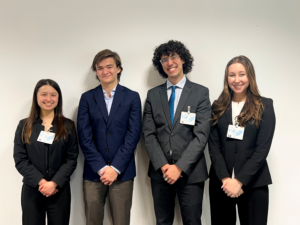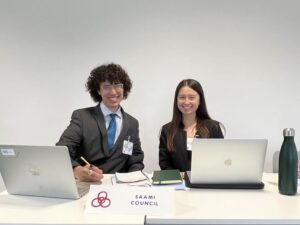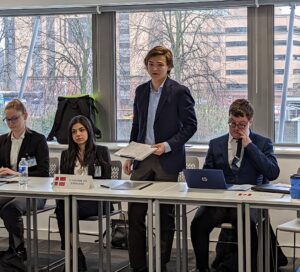Students represent University of St Andrews at SCOTMAC 2023

In March 2023, four students; Heather Fortune, George Barton, Eric Dunham and Lily Bolash from the University of St Andrews were shortlisted to participate in Scotland Model Arctic Council 2 (SCOTMAC 2) held at Glasgow Caledonian University in Glasgow, Scotland. SCOTMAC is one of the only Model Arctic Councils in the world today designed with undergraduates in mind. In the conference, students play the roles of delegates from Arctic states and, discuss the various questions around environmental protection, sustainable development and ancient cultures while learning consensus-building skills and building lasting friendships. Our students engaged in model diplomacy over these days and had access to expert teaching and special networking events.
It is an informal community open to anyone interested in Scotland’s relationship with the Arctic. Its foundation is the Scottish Government Arctic Policy Framework – Arctic Connections – which was launched in 2019. The network exists to promote discussion, advice, points of contact and information sharing.
The University of St Andrews is a member of the Scottish Arctic Network (ScAN), a collaborative alliance of universities researching, teaching and learning about the Circumpolar North. ScAN is built around the Scottish universities who are members of the University of the Arctic (UArctic) in partnership with the Scottish Government’s Nordic and Arctic Unit.
In this blog, read the experiences of two students who reflect on what it was like to participate in this unique opportunity.
Heather Fortune, BSc (Hons) Ecology and Conservation, Year 4

A couple weeks ago, I had the privilege to participate in Scotland Model Arctic Council (SCOTMAC) 2, hosted by Polar Aspect and Glasgow Caledonian University. Representing the University of St Andrews in a delegation with Eric Dunham, we served as the Saami Council – and won the special commendation award for constructive contributions to meetings, knowledge of the Arctic and Permanent Participant represented and credibility of ‘acting’ our role.
A diplomatic simulation of the Arctic Council, we discussed two topics during SCOTMAC: the future of Arctic cooperation (at a time where real Arctic Council activities have been paused by the Russian invasion of Ukraine) and climate engineering in the Arctic. This led to the successful creation of the ‘Glasgow Declaration’.
As a Biology student, diplomacy is not something I have much experience in, and I was nervous to attend the event. However, I believe that too often science neglects to have a real understanding of the circumstances of those it affects, and so can cause unintended harm. Therefore, my main motive to attend was to gain more understanding of the unique challenges faced by Indigenous and minority communities.
By putting myself in the shoes of the Saami Council, I do feel that I developed more of an understanding of how such groups can be overlooked and the injustices imposed upon them. Even so, I realise that this is just the tip of the iceberg, and I have far more to learn about the Arctic and its peoples. Participating also made me recognise the difficulty of negotiation and the importance of communication, even in trying times.
Overall, this has been an eye-opening and rewarding learning experience, and I extend thanks to everyone involved!

George Barton, International Relations, BA (Int Hons) International Relations, Year 1
As a first year International Relations student, I found the opportunity to participate in SCOTMAC 2 extremely valuable for exploring the wide world of diplomacy. At the start of my first year, I had a very vague view of who diplomats where and what their jobs were. I feel as if my image of diplomacy based on popular culture was very different than what it actually entails. SCOTMAC and other model councils provide the opportunity to engage in diplomacy hands on, walking you through each component of reading, writing, and representing. The organizers of SCOTMAC create a format that makes engaging research accessible through a simple format (research that also applies to first year essay topics!). Furthermore, I found drafting position documents and speeches challenging but informative. Finally, representing my opinions in a diplomatic fashion created a fascinating learning environment where I felt as if every remark, I made was slightly better than the last. To summarize the benefits of SCOTMAC briefly, it provided me with knowledge about a career in diplomacy that I couldn’t have learned in a book. It was my, as well as many others, first time ever participating in a model council of any kind. I now believe my internship and career search is significantly more informed.
Additionally, Glasgow is an excellent city (reminds me of America) and the people at SCOTMAC are very sociable. You get a bursary of £150 (although you do have to front the cash), so it’s affordable to go. Two of the nights, including a black-tie dinner at the Corinthian Club (the fanciest restaurant in Glasgow), were completely free. Glasgow night life is miles better than St. Andrews, which can be rather quiet and predictable. The event does allow you to connect with really cool researchers and academics doing work in the Arctic. Lastly, it is just fun to go to a different city wearing a suit like you’re on a business trip, it makes you feel like a real adult doing big things in a big world. In conclusion, I can’t recommend future SCOTMAC experiences enough!
You can track upcoming opportunities like SCOTMAC by following the Global Office on Twitter, Facebook, Instagram and for more specific queries you can write to [email protected].